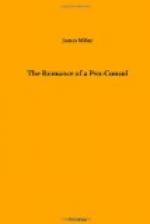‘This scene,’ said Sir George Grey, ’did not live wholly to me, until I met with an incident while hunting in South Africa. Coming upon a young spring-buck, which had been exhausted by the pursuit, I lifted it into the saddle before me, and carried it home. All the way, the velvety skin of the little fellow was brushing against my clothes.
’These were not worn again for some time, and when I did take them out, I was struck by their delicious smell of herbs and grasses. The scent had been communicated by the spring-buck, accustomed to make its home among the sweet growths of nature. It was the hunter’s fragrant smell which, in part, caused Isaac to mistake Jacob for Esau.’
While trekking through Cape Colony, to see everybody and everything for himself, Sir George was often able to be the keen sportsman. Before his camp was awake, of a morning, he would make a bowl of black coffee, shoulder his rifle, and start off, with a couple of bush-boys for gillies. He would return in the forenoon, deal with his work as Pro-Consul until the evening, and then, perhaps, seek another shot. Or, if his people were on the move, he might sally from them at one point, and rejoin them later. Deer of various sorts were not scarce, and he kept the camp larder furnished with fresh meat. The Mahomedans, among his motley following, ate with relish the product of his rifle.
‘They trusted me,’ he dwelt on that, ’to say “In the name of the Lord,” when a beast was killed, so observing the Mahomedan rite. They would not have eaten of its flesh, had they not known that their belief was expressed, “You are not to destroy one of the Creator’s creatures, except by His permission.” Whenever Mahomedans were with me, I undertook to observe the rule, nor did I ever fail.’
One. sees, in that fact of chance mention, another evidence of how Sir George came to be such a force among the raw men of the earth. He had the genius for taking pains to understand them, and thus, even unwittingly, made them his disciples. Just, he touched the spot.
In his reign at the Cape, the lion was still rampant far south of the Zambesi. Twice, while hunting, he got on the trail of the monarch, but he never slew him. A leopard would skulk into the demesne of Table Mountain itself, and be ingloriously trapped. The lion made other sport, lying on a high place while it was day, and going forth to roam at dark. Sir George went to the Bible for the character sketch of the lion, in particular to the Psalms:
Thou makest darkness,
and it is night;
Wherein all the beasts
of the forest do creep forth.
The young lions roar
after their prey,
And seek their meat
from God:
The sun ariseth, they
gather themselves together,
And lay them down in
their dens.




